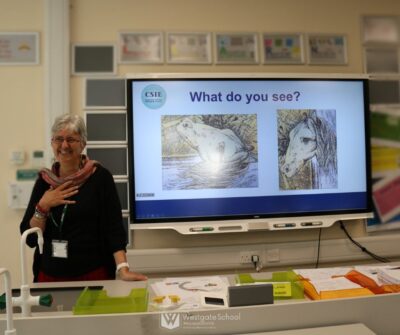May 31, 2024
We were delighted to be invited by Westgate School in Slough to support their work on developing a more inclusive school.
Earlier this month we led a training event for all staff, which focused on reviewing the learning environment and exploring practical ways of making the school as inclusive as possible for everyone.
The workshop was framed around the 9 protected characteristics of the Equality Act 2010 and stressed the importance, and the school’s legal obligation, to ensure students learn about all 9 of these characteristics and understand how essential it is that every aspect of a person’s identity is respected.
Last week we led workshops for over 1,000 students in years 7, 8, 9, 10 and year 12. These workshops were also framed around the 9 protected characteristics and focused on the 7 that are most relevant to students while they are at school (age, disability, sex, sexual orientation, gender identity, ethnicity and religion).

We used the ‘power flower’, a self-reflection tool created by Canadian social change educators, and invited every student to think about each of these aspects of their identity. We also asked them to reflect on how each of these aspects of their identity may give them – or take away from them – any sense of power or privilege.
We also spoke about how we do not get to choose who we are, though we do have a choice of how to express our identity and how to interact with others. This gave us a chance to think about how we respond to difference, and to reflect on the importance of treating everyone with respect.
As part of this conversation we also explored the impact of our behaviour on others. With the older students, we considered the relationship between bullying in school and hate crime in society (so, the realisation that treating others badly is usually called bullying in schools and has some consequences, and yet similar behaviours outside of school may be seen as unlawful discrimination, might even be classed as a hate crime, and carry far more serious consequences).
At the end of each workshop we asked students to write down their answers to three questions: what they most liked about this workshop, what they would like the school to do and what they are willing to do, to make the school a more welcoming and more inclusive place for everyone.
We were very impressed with the level of engagement from students, and with their answers to these questions. Many of them told us that they liked how the workshop made them think, and how they learnt new things. In response to what they would like the school to do, a number of students said that they would like more workshops like this. And in response to the last question, what they are willing to do, a large number of students said that they will try to be kinder to others.
We find this a very promising response and look forward to working with Westgate school again in the future, to support the development of inclusion, and help ensure that every student finds the school a welcoming place and feels a sense of belonging.


